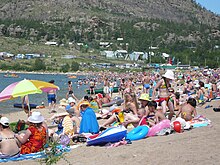Bayanaul National Park
The Bayanaul State National Nature Park (Kazakh: «Баянауыл» мемлекеттік ұлттық табиғи паркі, romanized: «Baianauyl» memlekettık ūlttyq parkı; Russian: Государственный национальный природный парк «Баянаул», romanized: Gosudarstvennyy natsional'nyy prirodnyy park «Bayanaul») is a national park in Kazakhstan located on the outskirts of the Kazakh Uplands in the northeastern Pavlodar Province, 140 km from the city of Ekibastuz.
The park encompasses 68,453 hectares and was created to conserve the natural flora and fauna of the Bayanaul Range.
These mountains took shape during the Paleozoic Era and have since endured millennia of continental destruction, resulting in their relatively low elevation (400 to 1,027 m).
The park is botanically diverse and supports approximately 460 plant species, including the Bayanaul pine and the black alder.
Scenes of pine vegetation juxtaposed with bare rock are considered a main tourist draw to the park.
Along with birches, pines, alders, and aspens, many bushes and shrubs occur in the park, including berry-bearing varieties such as raspberries, rose hips, currants, and hawthorns.
Bayanaul does not usually experience the strong winds and dust storms common in the steppe regions of Pavlodar Province.
Several recreational activities are offered in the park, including swimming, hiking, rock climbing, and mountain biking.
The national park contains large rock formations that have taken on bizarre shapes due to centuries of environmental erosion and often resemble animals, people, and other objects, such as a truck coming down a mountain.
According to superstition, if someone enters the cave, places their palm on the wall, makes a wish, and then leaves without turning their head around to face the exit, their wish will come true.



